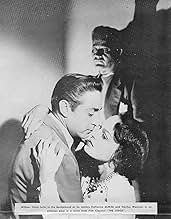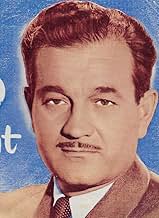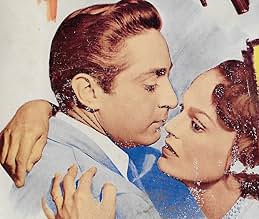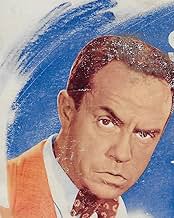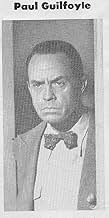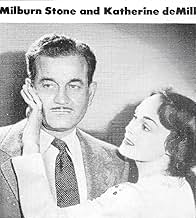Ajouter une intrigue dans votre langueA crooked lawyer blackmails a client into a murder plot against his wife.A crooked lawyer blackmails a client into a murder plot against his wife.A crooked lawyer blackmails a client into a murder plot against his wife.
- Réalisation
- Scénario
- Casting principal
Joseph Forte
- District Attorney
- (as Joe Forte)
Jess Kirkpatrick
- Patrolman Patrick Riley
- (as Jesse Kirkpatrick)
Al Rosman
- Crippled Victim
- (non crédité)
Avis à la une
The Judge is Jonathan Hale, who narrates this heavy-handed story about how defense attorney Milburn Stone gets Paul Guilfoyle off of a charge of murdering a police officer -- temporarily -- so he can play a game of Russian Roulette with him. It's a psychological drama, in which Stone and Guilfoyle are quite mad, for differing reasons
Elmer Clifton cowrote and directed this movie, and his long career in the movies explain the melodramatic rendering. They do not particularly explain the score by Gene Lanham, which consists of a choral effect, which tries to add gravitas to the goings-on. Everyone takes the performance very seriously, and while it may be all right, considering the anger which many people hold defense lawyers in, I found it fairly laughable, despite a good cast which includes Katherine Demille and everyone's favorite Perry White, John Hamilton.
Elmer Clifton cowrote and directed this movie, and his long career in the movies explain the melodramatic rendering. They do not particularly explain the score by Gene Lanham, which consists of a choral effect, which tries to add gravitas to the goings-on. Everyone takes the performance very seriously, and while it may be all right, considering the anger which many people hold defense lawyers in, I found it fairly laughable, despite a good cast which includes Katherine Demille and everyone's favorite Perry White, John Hamilton.
One of the last films directed by the great Elmer Clifton, whose career dates back to the mid-teens and D.W.Griffith, The Judge was also the first production of Ida Lupino's production company, first called Emerald Productions, later called The Filmmakers.
This is a quirky film which is both hard-boiled and pretentious, raw and artsy. It is also a film that raises as many questions as it answers. Elements are introduced into the story, covered in detail, and then not developed. Dream sequences are introduced, but are unclear. The main character--who is a sleazy defense attorney, NOT a judge--is well-played by Milburn Stone, but his story is not really typical of anyone other than this one oddball character. Why the film is called THE JUDGE, I don't know. The show begins and ends with a judge pulling out a file from his file cabinet, and talking about what a unique and disturbing case this was. The same judge does rule on an important case in the film, but he is not central--one wonders why the film is not called THE DEFENSE ATTORNEY? While star Milburn Stone and some of the supporting actors give good performances, the doctor and Stone's wife are both amateurishly played. Also, no scored instrumental music is feature in the film: only avant-garde acapella choral music, and the wire recording of the violin practicing that is used to get the psycho killer to grab a gun, which is used later as supporting music. This gives the film an art-film feel. A few scenes were unclear and required me to rewind the tape and watch them two or three times. The scene where the guy selling the dolls picks someone's pocket--the guy who later kills a policeman and is blackmailed by Stone--was unclear. Where was that gun coming from? Is this sloppy continuity, or an attempt at being ambiguous? Who knows... When the film ends, somewhat abruptly I might add, the viewer will probably have a number of questions as we did. However, whatever minor flaws I may complain about, The Judge is a unique film experience. Not entirely successful, but unique nonetheless.
This is a quirky film which is both hard-boiled and pretentious, raw and artsy. It is also a film that raises as many questions as it answers. Elements are introduced into the story, covered in detail, and then not developed. Dream sequences are introduced, but are unclear. The main character--who is a sleazy defense attorney, NOT a judge--is well-played by Milburn Stone, but his story is not really typical of anyone other than this one oddball character. Why the film is called THE JUDGE, I don't know. The show begins and ends with a judge pulling out a file from his file cabinet, and talking about what a unique and disturbing case this was. The same judge does rule on an important case in the film, but he is not central--one wonders why the film is not called THE DEFENSE ATTORNEY? While star Milburn Stone and some of the supporting actors give good performances, the doctor and Stone's wife are both amateurishly played. Also, no scored instrumental music is feature in the film: only avant-garde acapella choral music, and the wire recording of the violin practicing that is used to get the psycho killer to grab a gun, which is used later as supporting music. This gives the film an art-film feel. A few scenes were unclear and required me to rewind the tape and watch them two or three times. The scene where the guy selling the dolls picks someone's pocket--the guy who later kills a policeman and is blackmailed by Stone--was unclear. Where was that gun coming from? Is this sloppy continuity, or an attempt at being ambiguous? Who knows... When the film ends, somewhat abruptly I might add, the viewer will probably have a number of questions as we did. However, whatever minor flaws I may complain about, The Judge is a unique film experience. Not entirely successful, but unique nonetheless.
And also his last.... Yes, this scheme reminded me SO DARK THE NIGHT, where Steven Geray was a detective investigating on his own crime, the crime he commited himself. The story is not the same but the overall feeling for the audiences, who discover something unusual, different, is nearly the same. That's precisely what's interesting here, no cliché, nothing predictable. With Fritz Lang's BEYOND A REASONABLE DOUBT, the overall feeling for the audience is also close to this one; some court story so thrilling, exciting, because never seen before. Awesome ending too, to close a flat, bland director's career. Except his silent features. He died in anonymity.
This is a freakish movie, and it plays a bit like the old radio series "The Whistler."
(Remember that one? "I am the Whistler -- and I know many things, for I walk by night. I know many strange tales hidden in the hearts of men and women who have stepped into the shadows. Yes, I know the nameless terrors of which they dare not speak.")
In this case, instead of The Whistler, we have "The Judge," who opens up his file cabinet of past cases, narrates some opening psychobabble about human minds, and lets us witness first hand the sordid horrors of human psychiatric neurosis, complete with a woozy flashback scene, more casual gun-handling than i have seen outside of a Western, and an acapella choir that sounds like it swallowed a theramin.
And what about Milburn Stone? Wow! Doc Adams on TV's "Gunsmoke" surely deserves kudos for playing firmly against type here. as a man so unexpectedly motivated that to say anything more about his intentions would be to ruin the experience of watching the looks on his face shift with almost every line he delivers.
If this had been a pilot for a very weird short-run TV series, it would have become a cult classic. As it is, it is just straight-out bizarre.
By the way, i'll bet you dollars to donuts that the dog in the opening scenes was trained by Frank Inn, uncredited. It's a larger "Benji" type terrier-shaggy cross, and the stunt is set up exactly like all of Inn's best work with Higgins and his other dogs: The dog has a whole routine or scene memorized, and pulls it off in a nice, long take without ever once looking at the trainer for instructions. Good job, Anonymous Dog! Good job, Frank Inn!
(Remember that one? "I am the Whistler -- and I know many things, for I walk by night. I know many strange tales hidden in the hearts of men and women who have stepped into the shadows. Yes, I know the nameless terrors of which they dare not speak.")
In this case, instead of The Whistler, we have "The Judge," who opens up his file cabinet of past cases, narrates some opening psychobabble about human minds, and lets us witness first hand the sordid horrors of human psychiatric neurosis, complete with a woozy flashback scene, more casual gun-handling than i have seen outside of a Western, and an acapella choir that sounds like it swallowed a theramin.
And what about Milburn Stone? Wow! Doc Adams on TV's "Gunsmoke" surely deserves kudos for playing firmly against type here. as a man so unexpectedly motivated that to say anything more about his intentions would be to ruin the experience of watching the looks on his face shift with almost every line he delivers.
If this had been a pilot for a very weird short-run TV series, it would have become a cult classic. As it is, it is just straight-out bizarre.
By the way, i'll bet you dollars to donuts that the dog in the opening scenes was trained by Frank Inn, uncredited. It's a larger "Benji" type terrier-shaggy cross, and the stunt is set up exactly like all of Inn's best work with Higgins and his other dogs: The dog has a whole routine or scene memorized, and pulls it off in a nice, long take without ever once looking at the trainer for instructions. Good job, Anonymous Dog! Good job, Frank Inn!
I can't say too much about this film, "The Judge" from 1949. I saw a horrendous print, and I admit I found the story strange.
The movie stars Milburn Stone of Gunsmoke fame. I only know him from Gunsmoke, and I doubt I saw one episode all the way through. He plays attorney Martin Strang, known for taking high-profile cases and winning.
When he learns his wife is cheating on him, he comes up with a way to exact revenge. He approaches a cop killer, William Jackson (Paul Guilfoyle) and takes his case pro bono. However, he exacts a promise from Jackson, if he gets him off, he will ask for a favor in return.
Strang uses a loophole in the law so that Jackson's case is dismissed - temporarily. Jackson will not be indicted for killing a member of law enforcement, but he will be going down for murder. Before Jackson actually realizes this, Strang calls in the favor.
The rest was ridiculous and in fact, as is usual with a lousy script, the narrator had to explain the whole thing at the end. The only interesting thing to me was that the actor Stanley Waxman, who played Mrs. Strang's love interest, looked like Tyrone Power from a distance. The shape of the face, the hairline, the eyebrows. Up close he didn't look like him at all.
I am working off of a list of noirs. I have seen all of the famous ones. The rest of them have been a little disappointing. This was one.
The movie stars Milburn Stone of Gunsmoke fame. I only know him from Gunsmoke, and I doubt I saw one episode all the way through. He plays attorney Martin Strang, known for taking high-profile cases and winning.
When he learns his wife is cheating on him, he comes up with a way to exact revenge. He approaches a cop killer, William Jackson (Paul Guilfoyle) and takes his case pro bono. However, he exacts a promise from Jackson, if he gets him off, he will ask for a favor in return.
Strang uses a loophole in the law so that Jackson's case is dismissed - temporarily. Jackson will not be indicted for killing a member of law enforcement, but he will be going down for murder. Before Jackson actually realizes this, Strang calls in the favor.
The rest was ridiculous and in fact, as is usual with a lousy script, the narrator had to explain the whole thing at the end. The only interesting thing to me was that the actor Stanley Waxman, who played Mrs. Strang's love interest, looked like Tyrone Power from a distance. The shape of the face, the hairline, the eyebrows. Up close he didn't look like him at all.
I am working off of a list of noirs. I have seen all of the famous ones. The rest of them have been a little disappointing. This was one.
Le saviez-vous
- AnecdotesDespite what the narrator say, it is the jury that decides the fate of the defendant and in this case "freed" the defendant. The attorney did not free him, the attorney merely defended him.
Meilleurs choix
Connectez-vous pour évaluer et suivre la liste de favoris afin de recevoir des recommandations personnalisées
Détails
- Date de sortie
- Pays d’origine
- Site officiel
- Langue
- Aussi connu sous le nom de
- The Gamblers
- Lieux de tournage
- Société de production
- Voir plus de crédits d'entreprise sur IMDbPro
- Durée
- 1h 9min(69 min)
- Couleur
- Rapport de forme
- 1.37 : 1
Contribuer à cette page
Suggérer une modification ou ajouter du contenu manquant


